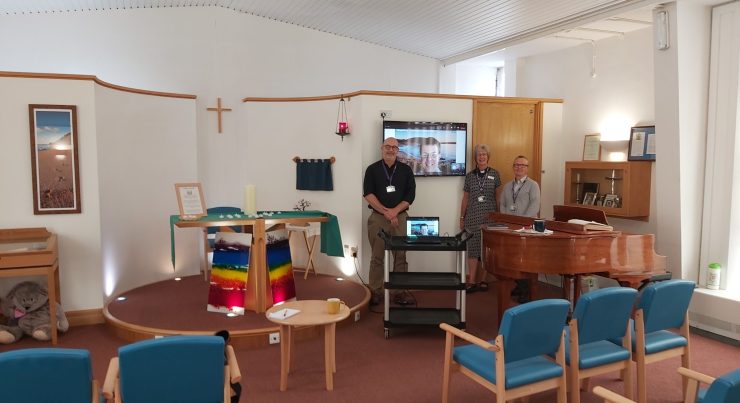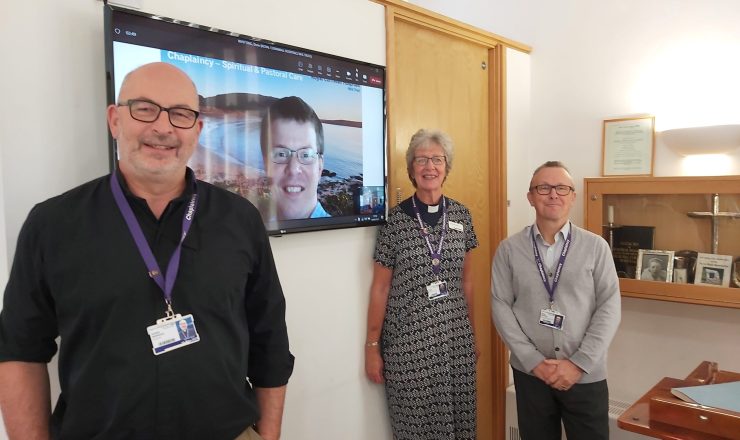Being there
Based primarily out of Treliske in Truro – but also serving hospitals across west Cornwall – Revd Mark Richards leads the chaplaincy team for Royal Cornwall Hospitals Trust.
Mark is himself a Methodist, and his team includes three Anglican chaplains, Revd Dom Whitting, Revd Angela Brown and Revd Keiren Marwood – although they all make it clear that the nature of their roles means they don’t stand on ceremony and they tend not to expect to be addressed as ‘Reverend’.
Those roles have of course changed over the years, but they continue to hold true to the core principles of chaplaincy.
“Traditionally we’ve been seen as specialist religious providers, but of course chaplaincy is much wider than that aspect of spiritual provision,” Keiren says.
“Historically, the meaning of the word ‘chaplain’ was to share one’s cloak with another,” Mark explains. “Although I’ve never had the opportunity to share my cloak, we do share the gift of time with our patients, their families and our colleagues, meeting them at their moments of deepest need, providing a listening ear, care, kindness and support in ways which are appropriate to their circumstances. They may be religious or not. We come alongside people, are present with them, being there in the deepest and fullest sense of what that phrase really means.
“Chaplaincy is having the courage to be fully present in the moment, knowing that at some point you may have no words to say, but remaining there still.”
This is a point with which Keiren agrees.
“Listening is an important part of what we do,” he says. “The difference between counselling and chaplaincy is that we’re not trying to solve a problem but are actively listening to the person talking through their concerns.”
Dom concurs. “It’s not about having all the answers,” he explains. “It’s about being able to hold that space of listening, and it’s often about not having any words to say. You have to be comfortable with that silence, that awkwardness, with having the confidence to know that you’re there, and that’s all that’s needed at that time.”
Mark supposes that the act of chaplaincy might remind us of the story of the resurrected Jesus appearing to his disciples on the road to Emmaus. “It’s a wonderful parable for what we do,” he says. “We’re often called to walk that road.”
“We accompany patients on their journey, whether that ends in hospital or in seeing them go home,” Angela adds. “And the other thing is that we’re a non-medical face. Patients have a lot of medical conversations – rightly so, of course they need those – but we can give them something different.”
It’s clear that all four find their roles – their vocations – both challenging and hugely rewarding.
“What nourishes me in my role is my Christian faith,” Keiren says. “And, by trying to bring something of Christ’s love, compassion and care to each person and each situation, that further nourishes me.”
“I think I’ve always seen chaplaincy and my role as a kind of as-you-go spirituality,” adds Angela. “You never know when you arrive in the morning who you’ll find yourself with. That makes me feel very connected to the spirit of Christ in myself and to the presence of Christ in each situation. The deepening of my trust and faith every day feeds me and my relationship with God.
“You get some beautiful moments with patients. I often feel that I’m receiving from the patients – it’s not about me giving – it’s more mutual than that. There are often of course some very difficult situations, but it’s about trusting that God is here in this place.”
Chaplaincy is for Dom the way he expresses and fulfils his vocation. He has served in parish ministry but this is where he feels at home.
“I’ve always had a sense of a calling to be a pastor,” he says. “I find in chaplaincy a full expression of that pastoral role. You’re walking alongside patients, families and hospital staff all the time. Even at times when I ask myself if this is still the right thing for me, I find God saying to me, This is where I want you to be.”
But that isn’t to underestimate the stresses of the work.
“The role of a chaplain is demanding, it’s draining on all levels,” Mark says. “We get to witness, to hear and to hold on a regular basis that which you probably wouldn’t see, hear or hold in other areas of ministry. Sometimes the work we do does have an effect on us.
“But what does chaplaincy mean to me? Ultimately, the simple answer is that it means everything. It’s wonderful. Even after all these years, it’s still the most rewarding and affirming ministry I’ve ever experienced, the fulfilment of my vocation.”
The chaplaincy team are there to support everyone involved in the life of the hospital, those of faith and of no faith. They can also be contacted by parishes and churches to provide support for their parishioners and members of their congregations who are in hospital.







